Women in recent decades have made significant progress in higher education and in the workplace. But they continue to lag behind men when it comes to wages and to representation in top leadership roles. At the same time, certain groups of men have struggled in the labor force and seen little or no growth in their wages.
We asked Americans how they think men and women are doing today compared with 20 years ago across a range of areas – from education and work to their relationships and physical health.
Overall, the public is more likely to see progress for women than for men over the last two decades in most areas we asked about.
Workplace and education
Majorities of adults say women are doing a lot or somewhat better than they were 20 years ago when it comes to:
- Getting leadership positions in the workplace (76%)
- Getting a well-paying job (74%)
- Getting into a college or university (66%)
By contrast, the public is more divided on whether men are doing better or worse in these areas. Substantial shares say men are doing neither better nor worse than they were two decades ago.
For example, while 76% of Americans say women are doing better today when it comes to getting leadership positions in the workplace, a far smaller share (27%) says men are doing better in this area.
The patterns are similar for progress in getting a well-paying job and getting into a college or university. In each case, much larger shares of the public say women are doing better today than say the same about men.
Differences by gender
Men are more likely than women to say women are doing better than they were 20 years ago in all three areas. Even so, majorities of both men and women say women have made progress in recent decades. For instance, 78% of men and 70% of women say women are doing better today in getting well-paying jobs.
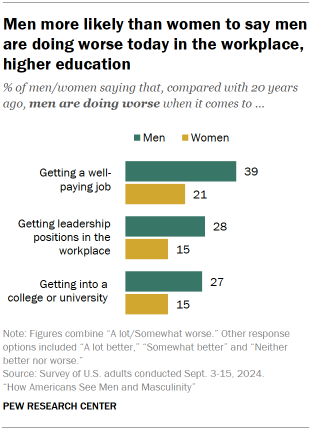
When it comes to how men are doing these days, women are more likely than men to see progress in each area. And men are substantially more likely than women to say men are doing worse.
Roughly four-in-ten men (39%) say that, compared with 20 years ago, men are doing worse in getting well-paying jobs. Among women, only 21% say the same.
Similarly, there are gender gaps in the shares saying men are doing worse in getting leadership positions at work (13 points) and in getting into a college or university (12 points).
Differences by party
Republicans and Democrats are largely in agreement about the progress women have made in the past two decades, with majorities saying women are doing better today in these aspects of work and education.
There are notable partisan differences in views about how men are doing, especially in the share saying men are losing ground. Republicans and Republican-leaning independents are more likely than Democrats and Democratic leaners to say men are doing worse, compared with 20 years ago, in all three areas.
Republican men in particular stand out: 43% say men are doing worse today when it comes to getting a well-paying job. This compares with 33% of Democratic men, 25% of Republican women and 18% of Democratic women.
The pattern is similar when it comes to men getting leadership positions at work and getting into college. About three-in-ten Republican men or more of say men are doing worse in these areas, compared with smaller shares among Democratic men and among both Republican and Democratic women.
Relationships and personal well-being
The survey also asked how men and women are doing these days, compared with 20 years ago, on several dimensions of life that relate to relationships and personal well-being:
- Having someone to turn to for emotional support
- Being in good physical health
- Balancing work and family responsibilities
- Finding a romantic partner
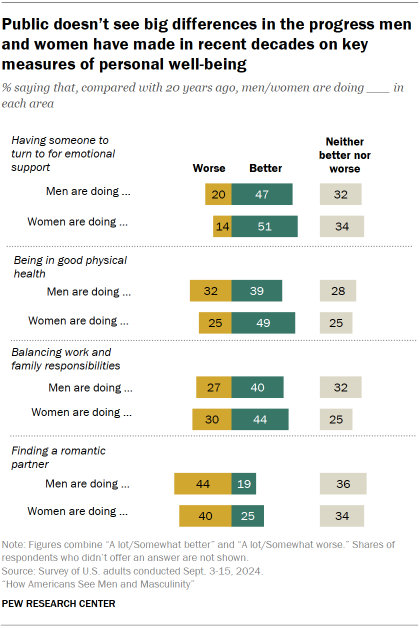
Views on the progress men and women have made in these areas are more closely aligned than on the economic and educational issues we asked about.
Overall, the public thinks both men and women are doing better rather than worse today when it comes to having emotional support and work-family balance.
The public is more likely to say women are doing better when it comes to their physical health than to say the same about men (49% vs. 39%). About a third of all adults (32%) say men are doing worse in this area.
The one area where a higher share of Americans say things have gotten worse rather than better for both men and women is in finding a romantic partner. Four-in-ten say women are doing worse in this area than in the past, and 44% say the same about men.
Differences by gender
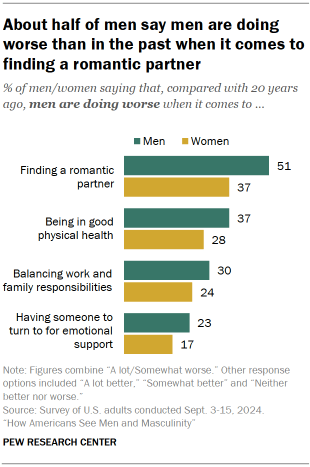
Men and women have similar views about where women are making progress and where they’re losing ground on issues related to relationships and personal well-being. There are some modest differences, however. Women (46%) are slightly more likely than men (42%) to say women are doing better today than they were 20 years ago when it comes to balancing work and family responsibilities.
Views differ more on the progress men have made in these areas. Women are more likely than men to say men are doing better these days when it comes to emotional support, work-family balance, physical health and finding a romantic partner. And men are more likely than women to say men are doing worse in each of these areas.
The gender gap in views about how men are doing in the dating realm is particularly wide. About half of men (51%), compared with 37% of women, say men are doing worse today in finding a romantic partner.
Differences by party
In general, Democrats are more upbeat about the progress men and women have made over the past two decades in these areas of their relationships and personal well-being. Democrats are more likely than Republicans to say women are doing better on each measure. For example, 52% of Democrats versus 37% of Republicans say that, compared with 20 years ago, women are doing better in balancing work and family responsibilities.
And Republicans are much more likely than Democrats to say women are doing worse today than they were in the past. For instance, while 31% of Republicans say women are doing worse in terms of their physical health, only 19% of Democrats say the same.
The pattern is similar when it comes to how men are doing. Larger shares of Democrats than Republicans say men are doing better than in the past in each area, while larger shares of Republicans than Democrats say they’re doing worse. Half of Republicans say men are doing worse in finding romantic partners than in the past; 38% of Democrats express this view.
Have women’s gains affected men?
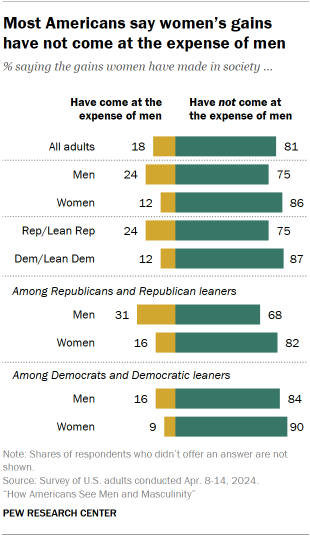
Most Americans (81%) say the gains women have made in society have not come at the expense of men, according to an April 2024 Pew Research Center survey. About one-in-five (18%) say these gains have come at the expense of men.
Views on this differ by gender and party. Majorities of both men (75%) and women (86%) say women’s gains have not come at the expense of men. Still, men are twice as likely as women to say that they have (24% vs. 12%).
Similarly, majorities of Republicans (75%) and Democrats (87%) say women’s gains haven’t hurt men. But Republicans are much more likely than Democrats to say they have (24% vs. 12%).
Republican men are among the most likely to say women’s gains have come at the expense of men. About three-in-ten (31%) say this, compared with 16% of Democratic men, 16% of Republican women and 9% of Democratic women.
How do Americans feel about how men and women are doing?
We asked Americans, in thinking about how things are going for men and women in the U.S. overall these days, how often they feel a range of emotions.
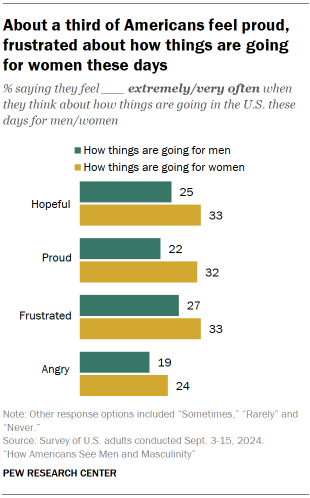
When thinking about how women are doing:
- 33% say they feel hopeful extremely or very often.
- 32% say they feel proud.
- 33% say they feel frustrated.
- 24% say they feel angry.
Somewhat smaller shares say they feel these emotions when thinking about how men are doing in the U.S. today:
- 25% say they feel hopeful extremely or very often.
- 22% say they feel proud.
- 27% say they feel frustrated.
- 19% say they feel angry.
Differences by gender and party in feelings about how women are doing
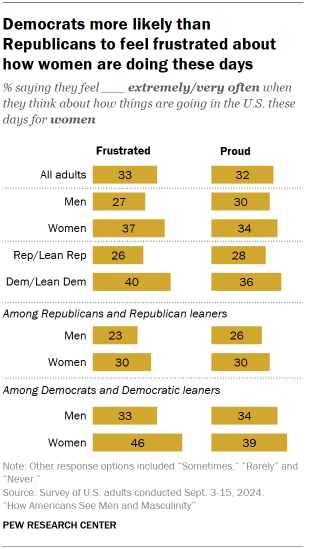
Women are more likely than men to say they often feel frustrated, proud or angry about how women are doing these days. And Democrats are more likely than Republicans to say they experience these feelings.
When it comes to frustration, 37% of women versus 27% of men say they often feel this way when thinking about how women are doing these days. And while 40% of Democrats say they often feel frustrated, only 26% of Republicans say the same.
Among Democrats, 46% of women say they often feel frustrated about how women are doing. This compares with 33% of Democratic men, 30% of Republican women and 23% of Republican men.
At the same time, women are more likely than men to say they often feel proud about how women are doing these days (34% vs. 30%). And a larger share of Democrats than Republicans say the same (36% vs. 28%).
Differences by gender and age in feelings about how men are doing
Men are somewhat more likely than women to say they often feel frustrated or hopeful when they think about how men are doing in the U.S. today. But the gender differences are modest.
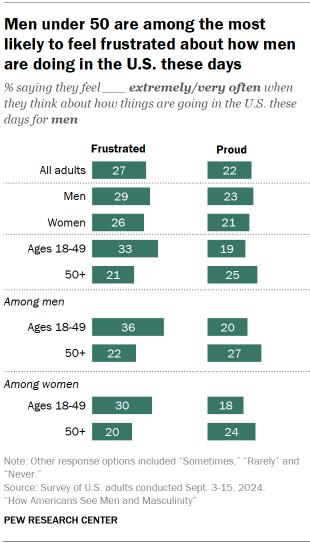
Adults under 50 are more likely than those ages 50 and older to say they feel frustrated or angry about how men are doing these days. And those in the older age group are more likely to say they feel hopeful or proud.
Men under 50 are among the most likely to say they often feel frustrated about how men are doing: 36% say this, compared with 22% of men ages 50 and older. Younger women are more likely than older women to say they feel frustrated as well (30% vs. 20%).
When it comes to feeling proud about how men are doing, men and women ages 50 and older are more likely than their younger counterparts to say they often feel this way.




